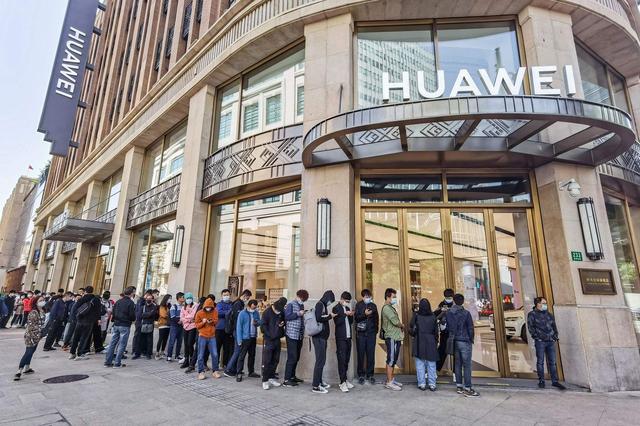[Hong Kong] Until it was detained in Canada nearly three years ago, Mr. Meng Ship flew around the world as the largest Chinese communication equipment (Huawei), the largest Chinese communication equipment (Huawei), who had no enemy.I was.
Huawei, who returned to China at the end of September this year, has been completely different from before, forced to retreat due to US sanctions, and has become a company that has been looking for future survival measures.
Huawei is in the middle of a serious management sluggish.At the beginning of last year, which is not distant, the company has expanded the market share of the 5th -generation mobile communication system (5G) that has begun to penetrate as the world's largest telecommunications equipment manufacturer, and rushes to the top of the world's smartphone market.It was going up.Despite the fact that import regulations to the company's products, which were imposed by the US Trump administration, had been applied for a year, the company had achieved these results.
Currently, the company's sales have been decreasing for the third consecutive year on a quarterly basis.The company's ranking, which was seen in smartphone sales, has retreated ninth in Europe and China.The company's share in the world's telecommunications market has also declined due to retreat in major markets.U.S. pressure has reduced the spread of 5G technology, and some customer companies are concerned about the company's technical competitiveness.
The U.S. government has introduced a wide range of regulatory measures to ensure that the Huawei cannot use parts and software made using US technology.In response, it has become difficult to procure parts necessary for the company's various business fields, such as mobile phones.The U.S. government has accused Huawei that steals and violates sanctions, but has denied the U.S. allegations.
US government officials and members have not changed the view that Huawei is a security threat.The reason is that the Huawei device is incorporated into the world's telecommunications market, which is concerned that the Chinese government may use these equipment, a private company, for spy and communication obstruction.
Huawei has repeatedly argued that the company will not be a security threat, claiming that US sanctions are unfair.The company has expanded its budget for lobby and public relations activities in the United States to request the U.S. government to reconsider, but has not shown a clear path to release sanctions.
U.S. sanctions have narrowed Huawei's semiconductor processing routes in non -US areas.As a result, the company has been forced to sell the cheap smartphone division, indicating that this year's smartphone sales will reach a maximum of $ 40 billion (about 4.465 billion yen).The company's dependence on the Chinese market has increased, and last year it accounted for two -thirds of the total sales.The ratio was 50 % in 2017.
The U.S. government sanctions with the company is the most destructive, and is successful.As a result, the company was forced to enter into a new business field, pass the overseas market, and build a supply chain (supply network) to eliminate the United States.In the meantime, the company's advanced semiconductor inventory decreased.The United States is extremely rare, even if the United States directly attacked large overseas companies such as Huawei, even if it was such a hitting.
Huawei executives have shifted business fields in electric vehicles (EVs), software, and coal mining technology, and explain that this kind of response is often a fight for survival.However, many of the initiatives are still in the early stages, and the ratio of sales is extremely low.
The sale of Huawei's core business is also falling into a struggle.In the first half of 2021, the company's sales of equipment for telecommunications operators, such as communication base stations and routers, fell 14 % year -on -year, to 136.9 billion yuan (approximately 2,34 billion yen).
Despite such troubles, Huawei made a quarterly profit and disclosed $ 55 billion of cash and short -term securities at the end of last year.Executives say that the company's abundant R & D budget is insurance.The company said last year that it spent $ 22 billion in R & D.This exceeds the amount of Apple spent in the last year.
Huawei has indicated that the sales income of telecommunications equipment will eventually show "modest but solid growth" by the end of the year as China's 5G spread accelerates.However, it is unlikely that emerging business will soon be able to make up for a decrease in income due to the sluggish smartphone sales.
On September 25, Meng returned to China as part of a prison exchange between China and Canada, and was greeted by a hero.He had been asked to hand over to the United States for false explanations to the company's bank about the business that Huawei was doing in Iran.He had an objection to it, during which his actions were restricted.
Meng acknowledged some fraud, claiming acquittal.This was a reward that the United States postponed the prosecution and would withdraw the prosecution next year if Meng did not violate the agreement.He is the daughter of CEO, the leading founder of Huawei.

In China, there are signs that the two Canadians have been released from Chinese prisons, but the US sanctions have been alleviated by the United States, although this transaction has been accepted as a great victory for Huawei.rare.The Biden administration officials say that Meng's release does not show the softening of US policy.Ceremony Gina Lemond told the press that the ministry will continue to prevent Huawei from getting advanced chips.
In June 2020, Huawei opened a vast retail store in an art deco -like building in Shanghai.The fans made a line outside the store to see smartwatches, tablet terminals and smartphones lined up on the table.
If you go there, you will encounter a different scene.On a weekday in August, three hybrid SUVs (sports multipurpose vehicles) were lined up in a prominent place, and mobile phones were driven by side tables.The salesperson was warning that there was not much mobile phone stock.Huawei did not emphasize the long -standing business field and focused on emerging businesses, including systems used for electric vehicles (EVs).
The car lined up was "Ceres (Sai Riki) SF5" manufactured by a small Chinese car manufacturer for Huawei.Huawei has designed an electrical drive system and an electronic device of this car.The company has also developed an advanced car with a state -owned automaker Beijing Train Group (BAIC Group), aiming to start sales by the end of the year.
Huawei has stated that cars will start selling cars at 1,000 stores around China by the end of the year.Executives have an ambitious goal of selling 300,000 units next year.This is almost twice the number of units sold by Tesla in China from January to August this year.
This year, Richard You, the head of Huawei's consumer business, said this year, "Huawei sells cars, which has the effect of profits caused by the United States's restrictions on telephone businesses.I can offset it. "
The company faces a strict competition in the crowded Chinese EV industry.EV sales are growing rapidly, but hundreds of new entrants have appeared.In September this year, the major technical regulatory authorities in China urged them to integrate, saying that there were too many companies in the sector.
Other new businesses in Huawei suggest that the direction of the company shifts from hardware to software that requires overseas supply chains.
Google's basic software (OS) Most of the "Android" system has become unusable due to US regulations, and Huawei has begun launching its own OS "Komo" (harmony) for smartphones this summer.The engineer has been developing this OS for many years, and first on smartwatches and speakers.Although the officers resisted the OS on the smartphone, they had to do it because the main features of Huawei's smartphone using Android were lost.
Huawei officers hope that other companies that handle mobile phones and related devices will adopt this new OS.So far, companies that have adopted the OS are mainly Chinese manufacturers, such as Hiar (Kaishi) and Media (aesthetic), which are working on home appliances connected to the Internet.Huawei explains that more than 100 million smartphone users are currently using the harmony OS.
According to Neil Shahh, a vice president of a counter point research based in Hong Kong, almost all of users are limited to China.U.S. government sanctions have excluded popular US apps, such as Netflix Facebook Uber, and has reduced their popularity in Western countries.Rival makers in the country, including Xiaomi (small rice), which captured the world's largest smartphone sales of the world's largest smartphone, continues to be Android on their products.
Other new businesses revealed this year include the introduction of artificial intelligence (AI) to pig farming and 5G cameras for fish aquaculture monitoring.In May, Hong Kong -based beauty sales companies selected Huawei as a company provided by retail systems such as data analysis and electronic payments.
Hong Kong's research company Gabecal Dragonomics technology analysts and Shanghai -based Dan Wan said, "There is no sufficient size to make up for the decline in smartphone sales."Was pointed out.
ニュースレター購読
週末号
We will deliver a deep digging article unique to the WSJ carefully selected by the editor -in -chief.(Delivery date: Saturday)
購読Huawei's Vice Chairman Eric Shoe and Chairman and Wanban said this year that the company had found measures to efficiently use semiconductor inventory.At present, some shortage of stock seems to be occurring.The company's smartphone flagship model "P50" announced by the company in July this year was not 5G compatible.The company mentioned it because of the lack of high -performance chips.
In August, in August, he said in an employee's speech, "With the last two years of US regulatory measures, we will no longer aim for the best parts to make the best products."He said, "It has been switching to the production of high -quality products using appropriate parts, which has greatly improved profitability."
Huawei explains that it is a major business of the company that sells communication equipment such as base stations, routers, and switches, and that parts supply is still sufficient.
According to the U.S. Diplomatic Council's March this year, the U.S. government has launched a policy that claims that Huawei networks have security risks, and the company, Australia, Japan, etc.It was closed out of the 5G business in the market.Many countries are regulating the company's technology.
According to the Dero Group, a research company, the share of Huawei's telecommunications equipment market has expanded every year since 2007, but in the first half of this year, 29 %, below the previous year.
関連記事


